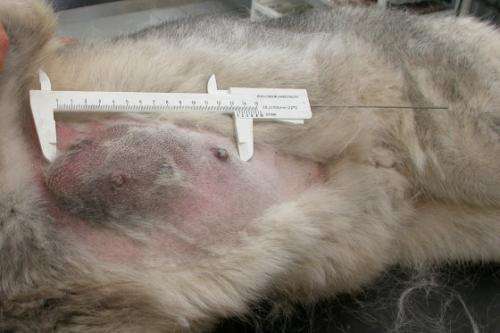Genetic studies of mammary tumours (breast cancer) in dogs

Mammary tumours (breast cancer) are the most common form of cancer in bitches. Kaja Sverdrup Borge's PhD project has led to the identification of genetic changes associated with these types of tumour. Her findings can help to improve our understanding of the development of breast cancer in both dogs and humans.
Cancer is the most common cause of death in dogs and is therefore an important factor in the health of dogs. The incidence of cancer varies according to the breed of dog and this would indicate that genetic risk factors play an important role in the development of the disease. But we still know little about which genes and mutations can lead to the development of mammary tumours in dogs.
Borge studied known risk genes in dogs to learn more about the genes that predispose to canine mammary tumours. These genes are already known to be linked to cancer in humans. Borge discovered that there was a large variation in these genes from breed to breed. Some of the variants proved to have a detrimental effect and could lead to a potential change in the risk of developing cancer.
Borge compared the incidence of these genes in different groups of English springer spaniels with and without mammary tumours. The genes were also studied in another group of dogs from breeds having either a high or low incidence of mammary tumours. The results of these analyses indicate that variants of the oestrogen receptor gene are associated with the risk of developing mammary tumours in dogs.
Cancer occurs when mutations occurring over a period of time in several important genes change the function of these genes. Borge examined canine mammary tumours in order to identify mutations which have arisen in tumours and may therefore be involved in the development of cancer. She focused on changes in the number of gene copies where there was either a decrease or increase in gene areas in the tumours.
Borge found a large number of mutations and the number of aberrations increased, the more malignant the tumours turned out to be. She detected major cancer genes known to occur in humans but also identified new areas. Borge also demonstrated that linking detailed histopathological parameters from mammary tumour diagnostics to genetic mutations could help to chart specific genes that lead to the growth of tumours and to more malignant types of cancer.
Increased knowledge about the genetic changes which cause cancer is essential for the prevention, diagnosis and treatment of the disease. The results of Borge's doctoral research will in the first instance help to improve our knowledge on the subject related to dogs, but they also show that there are many similarities between carcinogenic gene mutations in both canine and human breast cancer. This means that studying dogs is a good way of identifying genetic risk factors for cancer and can also lead to a better understanding of how cancer develops in humans.
Borge carried out her study in conjunction with the Research Group for Medical Genetics at the Norwegian School of Veterinary Science.
Cand.med.vet. Kaja Sverdrup Borge defended her doctoral research on 29th November 2013 at the Norwegian School of Veterinary Science with a thesis entitled "Genetic characterization of canine mammary tumours: germline mutations and genomic aberrations".
Provided by Norwegian School of Veterinary Science















